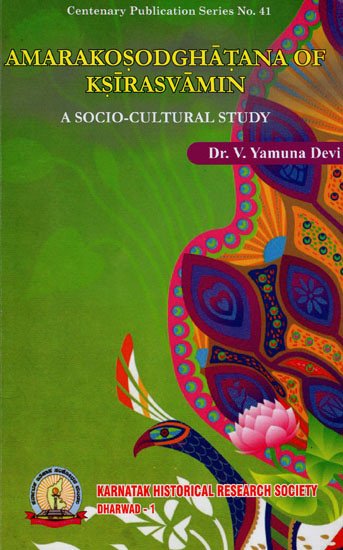Amarakoshodghatana of Kshirasvamin (study)
by A. Yamuna Devi | 2012 | 77,297 words | ISBN-13: 9788193658048
This page relates ‘Philosophy (5): Bhagavad Gita’ of the study on the Amarakoshodghatana of Kshirasvamin (in English) which represents a commentary on the Amarakosha of Amarasimha. These ancient texts belong the Kosha or “lexicography” category of Sanskrit literature which deals with the analysis and meaning of technical words from a variety of subjects, such as cosmology, anatomy, medicine, hygiene. The Amarakosa itself is one of the earliest of such text, dating from the 6th century A.D., while the Amarakoshodghatana is the earliest known commentary on that work.
Philosophy (5): Bhagavad Gītā
Kṣīrasvāmin cite from Bhagavad Gītā in seven places in the entire commentary. But only three of them deal with the philosophical view of the text. They are as below–
(a) Kūṭa (III. 3. 37; p. 278)–
[Invariable:]
Explaining the homonymous term kūṭa in the sense of niścala or invariable, Kṣīrasvāmin quotes from Bhagavad Gīta (15-6)–
niścale yathā—kūṭasatho'kṣara ucyate |
(b) Bhāva (III. 3. 207; p. 321)–
[Birth:]
Amarakośa mentions birth as one of the meanings of bhāva, illustrating this, Kṣīrasvāmin quotes from Bhagavad Gītā (II. 16) that:
‘The unreal has no existence’–
janamani yathā—nāsato vidyate bhāvaḥ |
(c) Dhruva (III. 3. 211; p. 322)–
[Eternal:]
Amarakośa records the various meanings of the word dhruva where one of them signifies eternal. Kṣīrasvāmin illustrates this meaning quoting the Bhagavad Gītā (II. 27)
‘For one who is born, death is certain; and to one who dies, rebirth is certain’–
jātasya hi dhruvo mṛtyurdhruvaṃ janma mṛtasya ca |
